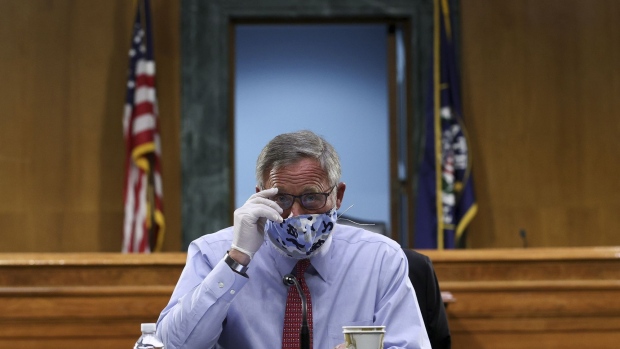May 14, 2020
FBI Seizes Senator’s Phone in Insider-Trading Case, Report Says
, Bloomberg News

(Bloomberg) -- FBI agents seized the mobile phone of Senator Richard Burr, the chairman of the Senate Intelligence Committee, as part of an investigation into stock sales, according to a published report.
Burr, a North Carolina Republican, and three other senators sold holdings after receiving closed-door briefings on Capitol Hill early this year about the emerging threat of the coronavirus.
The Los Angeles Times, quoting an unnamed source, reported on Wednesday night that agents, acting on a search warrant, took Burr’s phone at his home. The newspaper, citing another unnamed source, said that the bureau took that step after issuing a warrant to Apple Inc. for information on the senator’s iCloud account.
The senator’s office declined to comment on the Times report late Wednesday night.
Burr and Kelly Loeffler, a Georgia Republican, both completed their transactions at a time when the Trump administration and Republican leaders were downplaying the potential damage the illness could cause in the U.S.
Burr’s office has said that the sales were unrelated to any information he received by virtue of his position as leader of the Intelligence Committee, which gets frequent briefings about threats facing the country.
In March, Burr called for an inquiry into the allegations, adding that he had “relied solely on public news reports” in making his investment decision.
That same month, the senator by was sued by a Wyndham Hotels & Resorts Inc. investor who claimed he had engaged in stock fraud.
Two other members of the Intelligence Committee, Senator Dianne Feinstein, a Democrat from California, and Senator James Inhofe, an Oklahoma Republican, also sold stock after the briefings, according to financial records.
Feinstein denied she had sold assets or that she was at the January 24 briefing on coronavirus. In a tweet, she added that her assets were held in blind trust. Inhofe said in a tweet that he wasn’t at the meeting either and called the allegations baseless and false. Loeffler as well has strongly denied any wrongdoing.
Burr sold 33 stocks on Feb. 13, according to his financial disclosure form, with a total value between $628,000 and $1.7 million. The sales were first reported by ProPublica. Three of the assets he sold were in hotel companies, which have seen their value plummet because of the global lockdowns brought about by the coronavirus pandemic.
The Stock Act of 2012 made it illegal for members of Congress and federal officials to trade on nonpublic information about pending regulatory or legislative decisions. The law also requires them to publicly disclose stock transactions within 45 days after making them -- in addition to the annual disclosure listing assets and liabilities.
Burr has been working on a final report for his panel’s nearly three-and-a-half-year investigation into Russian interference in the 2016 election and had planned to get it out in the next few months.
©2020 Bloomberg L.P.





